七年级英语下册Unit7SectionB导学案
- 格式:doc
- 大小:57.00 KB
- 文档页数:4
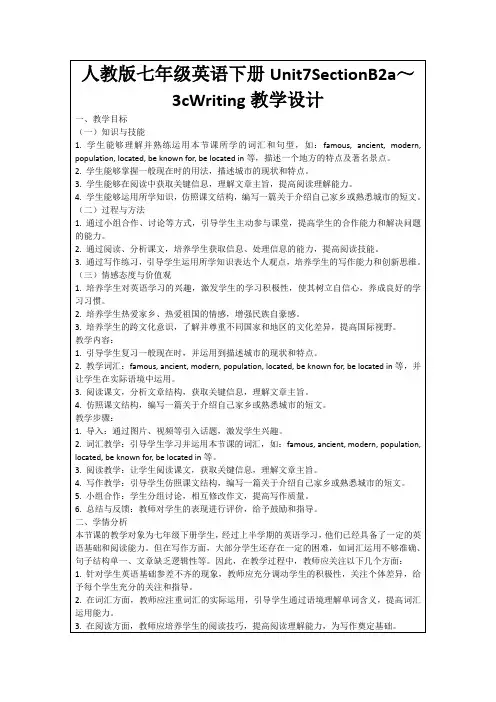

Unit7 Topic3 SectionB 参考教案Ⅰ. Material analysis本节课将继续学习一般过去时。
主要活动是1a 和2a。
通过听说、借助图片等一系列活动引导学生掌握正确运用一般过去时表达过去事件,另外还将学习动词一般过去时的用法以及谈论关心、建议与道歉的表达方式;还将要求学生掌握并运用不规则动词的一般过去时。
Ⅱ. Teaching aims1. Knowledge aims能够根据已学语音、音标以及发音规则,正确朗读下列词汇并运用于情景对话中:matter, fall, poor, myself, wash, ouch, washroom能够掌握并运用不规则动词的一般过去时,如:sing—sang, do—did, fall—fell能够运用一般过去时表达过去的事件、生日庆祝活动等,如:I missed the chair and fell down.What’s the matter?This way, please.能够运用谈论关心、建议与道歉的表达方式,如:I am afraid it was too late.Did you hurt yourself?Don’t be so late next time.I’m sorry, Dad. I won’t do that again.2. Skill aims能够听懂有关生日庆祝活动,娱乐活动等句型和对话,并作出正确反应;能在课堂活动中交流过去的事件和生日庆祝活动的表达方式;能够正确地朗读对话和短文,注意语音语调;能够模仿课文,编写询问生日庆祝活动的对话。
3. Emotional aims培养学生学好英语的信心;鼓励学生积极大胆,敢于模仿,克服不愿或羞于开口的心理。
Ⅲ.The key points and difficult points1. Key points能够熟练掌握并运用不规则动词的一般过去时:sing—sang, do—did,fall—fell 等;能够应用一般过去时表达过去的事件、生日庆祝活动等;能够应用谈论关心、建议与道歉的表达方式。
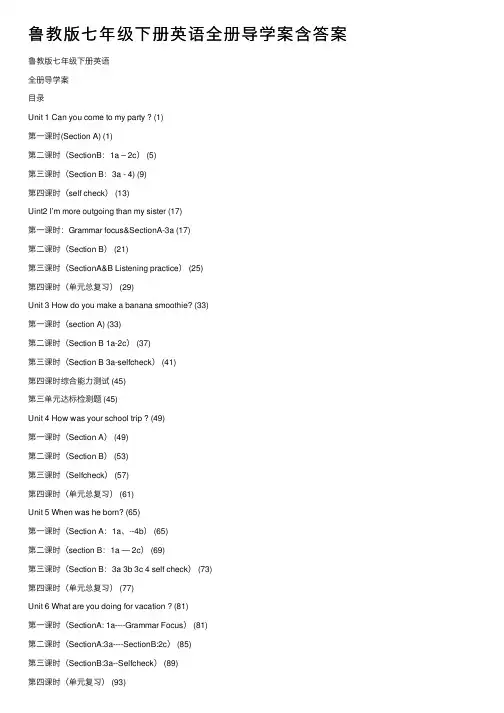
鲁教版七年级下册英语全册导学案含答案鲁教版七年级下册英语全册导学案⽬录Unit 1 Can you come to my party ? (1)第⼀课时(Section A) (1)第⼆课时(SectionB:1a – 2c) (5)第三课时(Section B:3a - 4) (9)第四课时(self check) (13)Uint2 I’m more outgoing than my sister (17)第⼀课时:Grammar focus&SectionA-3a (17)第⼆课时(Section B) (21)第三课时(SectionA&B Listening practice) (25)第四课时(单元总复习) (29)Unit 3 How do you make a banana smoothie? (33)第⼀课时(section A) (33)第⼆课时(Section B 1a-2c) (37)第三课时(Section B 3a-selfcheck) (41)第四课时综合能⼒测试 (45)第三单元达标检测题 (45)Unit 4 How was your school trip ? (49)第⼀课时(Section A) (49)第⼆课时(Section B) (53)第三课时(Selfcheck) (57)第四课时(单元总复习) (61)Unit 5 When was he born? (65)第⼀课时(Section A:1a、--4b) (65)第⼆课时(section B:1a — 2c) (69)第三课时(Section B:3a 3b 3c 4 self check) (73)第四课时(单元总复习) (77)Unit 6 What are you doing for vacation ? (81)第⼀课时(SectionA: 1a----Grammar Focus) (81)第⼆课时(SectionA:3a----SectionB:2c) (85)第三课时(SectionB:3a--Selfcheck) (89)第四课时(单元复习) (93)Unit 7 I’ m going to be a basketball player. (97)第⼀课时(1a----Grammar Focus) (97)第⼆课时Section A3a- SectionB 2c) (101)第三课时(SetionB3a—self-check) (105)第四课时(检测你雄厚的综合实⼒吧!) (109)Unit8 Could you please clean your room? (113)第⼀课时Section A (1a----Grammar Focus) (113)第⼆课时(3a----2c) (117)第三课时(3a-self-check) (121)第四课时 (125)Unit 9 What’s the best radio station? (129)第⼀课时(section A 1a-2c) (129)第⼆课时(section A 3a - self check) (133)第三课时(单元复习) (137)Unit 10 It’s a nice day ,isn’t it ? (141)第⼀课时(Section A:1a---4) (141)第⼆课时(Section B:1a--- 4) (145)第三课时单元复习 (149)Unit 1 答案 (153)unit2参考答案 (155)Unit3 参考答案 (157)单元达标检测题 (158)Unit 4 参考答案 (160)Unit 5参考答案 (163)unit6 答案 (165)unit7 参考答案 (166)Unit 8参考答案 (167)Unit 9 参考答案 (171)Unit10参考答案 (172)Unit 1 Can you come to my party ?亲爱的同学们,你曾参加或举⾏过聚会吗? 欢迎你⾛进Unit 1 , 相信你会成为风度翩翩的绅⼠或举⽌⽂雅得体的⼥⼠的!第⼀课时 (Section A)当你被别⼈邀请时,你都会做到恰如其分、彬彬有礼吗?相信你没问题!学法导引:学会情态动词can 的⼀般疑问句式及其肯定回答和否定回答。
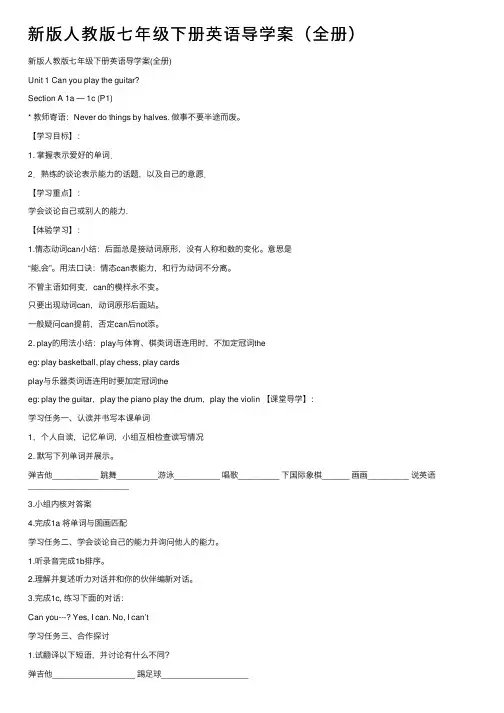
新版⼈教版七年级下册英语导学案(全册)新版⼈教版七年级下册英语导学案(全册)Unit 1 Can you play the guitar?Section A 1a — 1c (P1)* 教师寄语:Never do things by halves. 做事不要半途⽽废。
【学习⽬标】:1. 掌握表⽰爱好的单词.2.熟练的谈论表⽰能⼒的话题,以及⾃⼰的意愿.【学习重点】:学会谈论⾃⼰或别⼈的能⼒.【体验学习】:1.情态动词can⼩结:后⾯总是接动词原形,没有⼈称和数的变化。
意思是“能,会”。
⽤法⼝诀:情态can表能⼒,和⾏为动词不分离。
不管主语如何变,can的模样永不变。
只要出现动词can,动词原形后⾯站。
⼀般疑问can提前,否定can后not添。
2. play的⽤法⼩结:play与体育、棋类词语连⽤时,不加定冠词theeg: play basketball, play chess, play cardsplay与乐器类词语连⽤时要加定冠词theeg: play the guitar,play the piano play the drum,play the violin 【课堂导学】:学习任务⼀、认读并书写本课单词1,个⼈⾃读,记忆单词,⼩组互相检查读写情况2. 默写下列单词并展⽰。
弹吉他__________ 跳舞_________游泳__________ 唱歌_________ 下国际象棋______ 画画_________ 说英语______________________3.⼩组内核对答案4.完成1a 将单词与图画匹配学习任务⼆、学会谈论⾃⼰的能⼒并询问他⼈的能⼒。
1.听录⾳完成1b排序。
2.理解并复述听⼒对话并和你的伙伴编新对话。
3.完成1c, 练习下⾯的对话:Can you---? Yes, I can. No, I can’t学习任务三、合作探讨1.试翻译以下短语,并讨论有什么不同?弹吉他__________________ 踢⾜球___________________2.讨论如何询问第三⼈称能⼒的句型---Can he sing? ---Yes, he can. / No, he can't.---Can Tom speak English? ---Yes, he can. / No, he can't.【⾃主检测】:I.精挑细选1. Can you ________ English?A. speakB. talkC. say2. Can he __________ basketball?A. playB. playsC. playing3. My brother want _______ the chess club.A. joinB. to joinC. joins4. Mary can play the chess________ she can't swim.A. andB. orC. but5. His brother plays _______ piano every day.A. /B. aC. theII.翻译官说英语_____________ 弹吉他_____________ 象棋俱乐部__________ 下象棋______________ 英语俱乐部_____________ ⾳乐俱乐部__________ 美术俱乐部___________ 游泳俱乐部_____________ 参加___________ Ⅲ. 补全对话A. Can you ___________(唱歌)?B. Yes, I ________. Can you _________(游泳)?A. No, I want to join _______________(象棋俱乐部).B. I don't like ______________(象棋)A. What club do you want to __________?Unit 1 Can you play the guitar?Section A 2a— 2d (P2)* 教师寄语:Never do things by halves. 做事不要半途⽽废。
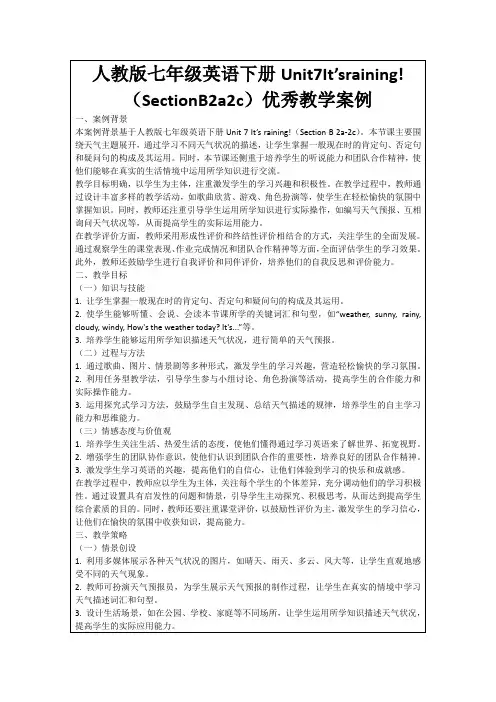
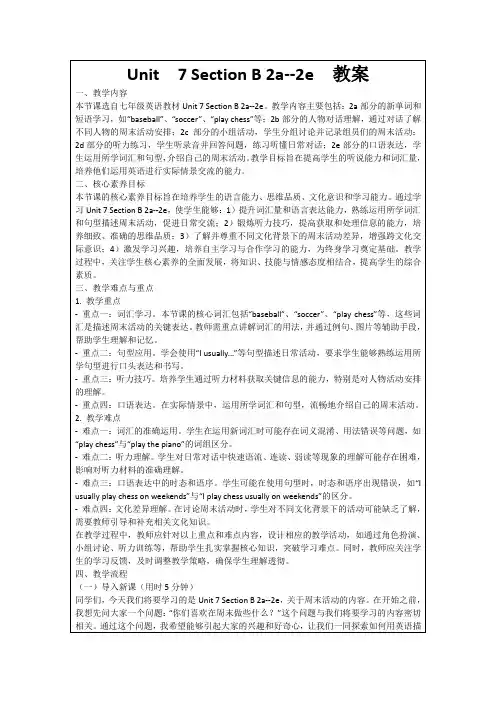
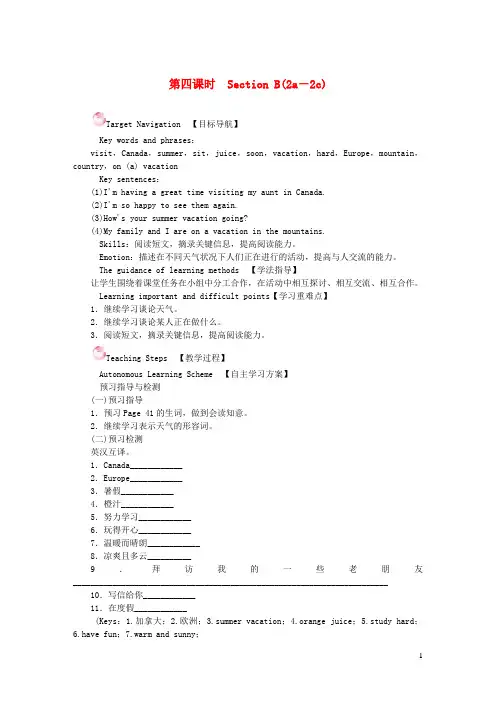
第四课时Section B(2a-2c)Target Navigation 【目标导航】Key words and phrases:visit,Canada,summer,sit,juice,soon,vacation,hard,Europe,mountain,country,on (a) vacationKey sentences:(1)I'm having a great time visiting my aunt in Canada.(2)I'm so happy to see them again.(3)How's your summer vacation going?(4)My family and I are on a vacation in the mountains.Skills:阅读短文,摘录关键信息,提高阅读能力。
Emotion:描述在不同天气状况下人们正在进行的活动,提高与人交流的能力。
The guidance of learning methods 【学法指导】让学生围绕着课堂任务在小组中分工合作,在活动中相互探讨、相互交流、相互合作。
Learning important and difficult points【学习重难点】1.继续学习谈论天气。
2.继续学习谈论某人正在做什么。
3.阅读短文,摘录关键信息,提高阅读能力。
Teaching Steps 【教学过程】Autonomous Learning Scheme 【自主学习方案】预习指导与检测(一)预习指导1.预习Page 41的生词,做到会读知意。
2.继续学习表示天气的形容词。
(二)预习检测英汉互译。
1.Canada____________2.Europe____________3.暑假____________4.橙汁____________5.努力学习____________6.玩得开心____________7.温暖而晴朗____________8.凉爽且多云__________9.拜访我的一些老朋友________________________________________________________________________ 10.写信给你____________11.在度假____________(Keys:1.加拿大;2.欧洲;3.summer vacation;4.orange juice;5.study hard;6.have fun;7.warm and sunny;8.cool and cloudy;9.visit some of my old friends;10.write to you;11.on a vacation)Classroom Learning Guidance Scheme 【课堂导学案】【探究一】1.Look at the pictures in 2a.Talk about the pictures in pairs.Finish 2a.2.Look at the postcards in 2b.Guess what they are talking about.3.Read through the postcards quickly.Finish 2c.4.Check the answers.【探究二】Pair workTalk about your own summer vacation according to the chart in 2c.【探究三】合作交流。
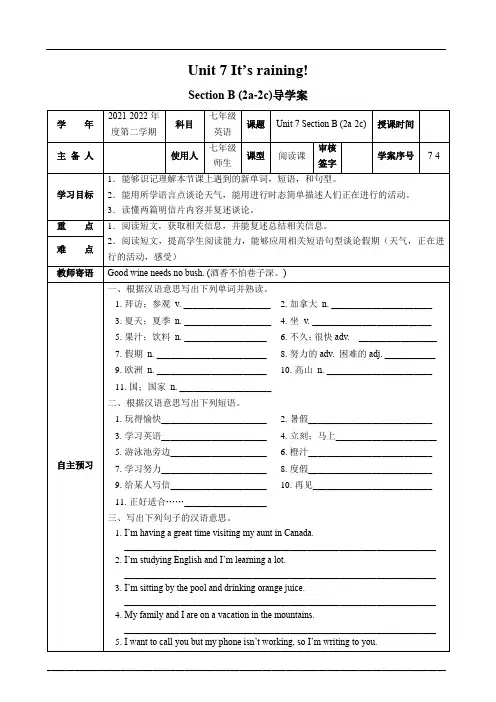
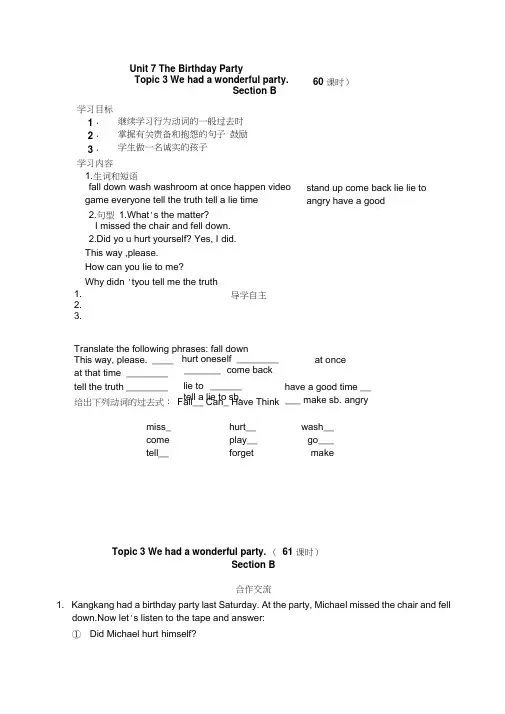
Topic 3 We had a wonderful party. ( 61 课时)Section B合作交流1. Kangkang had a birthday party last Saturday. At the party, Michael missed the chair and felldown.Now let 's listen to the tape and answer:① Did Michael hurt himself?Unit 7 The Birthday PartyTopic 3 We had a wonderful party.Section B60 课时)学习目标 1. 2. 3. 学习内容 继续学习行为动词的一般过去时 掌握有关责备和抱怨的句子 鼓励学生做一名诚实的孩子 1.生词和短语fall down wash washroom at once happen video game everyone tell the truth tell a lie time 2.句型 1.What 's the matter?I missed the chair and fell down. 2.Did yo u hurt yourself? Yes, I did. This way ,please.How can you lie to me?Why didn 'tyou tell me the truth 导学自主 stand up come back lie lie to angry have a good1. 2. 3. Translate the following phrases: fall down This way, please. ____ at that time ________ tell the truth ________ 给出下列动词的过去式: Fall__ Can_ Have Think hurt oneself ________ _______ come back lie to ______ tell a lie to sb. at once have a good time __ ___ make sb. angry miss_ come tell__ hurt__ play__ forget wash__ go___ make②Where did he want to go?2. Two students a group and act out 1a班级展示A、展示合作交流1B、展示合作交流23. 短文填空:At Kan gka ng ' birthday party, his frie nds played a game. Michael missed the chair and________ dow n. He couldntsta nd up. Did he hurt ______ ? No, he ______OK. Hishands got dirty. He had to wash them. He wan ted to go to the washroom. Kan gka ng____ him the way.C、Part 2 Listen and answe①Did Judy lie to her father?②Why did she come back late last night?质疑探究用所给动词的适当形式填空:1. Judy _____ (lie) to her father this mornin g. It ____ (make)her father very an gry.2. Michael ______ (fall)dow n but he ______ (not hurt) himself.3. Judy _____ (come) back late last ni ght. Her father ____ (th ink) she played video games.四、总结,生成新问题。
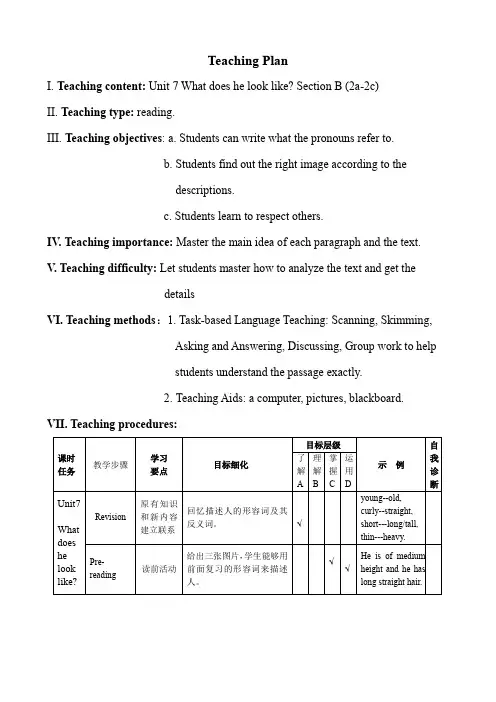
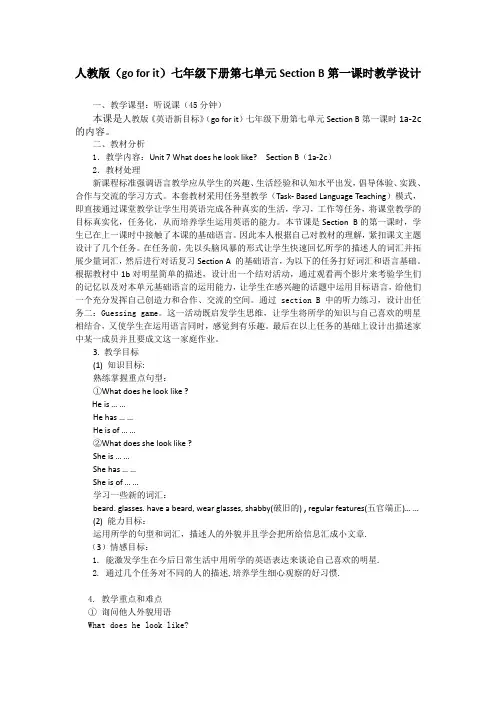
人教版(go for it)七年级下册第七单元Section B第一课时教学设计一、教学课型:听说课(45分钟)本课是人教版《英语新目标》(go for it)七年级下册第七单元Section B第一课时1a-2c 的内容。
二、教材分析1.教学内容:Unit 7 What does he look like? Section B(1a-2c)2.教材处理新课程标准强调语言教学应从学生的兴趣、生活经验和认知水平出发,倡导体验、实践、合作与交流的学习方式。
本套教材采用任务型教学(Task- Based Language Teaching)模式,即直接通过课堂教学让学生用英语完成各种真实的生活,学习,工作等任务,将课堂教学的目标真实化,任务化,从而培养学生运用英语的能力。
本节课是Section B的第一课时,学生已在上一课时中接触了本课的基础语言。
因此本人根据自己对教材的理解,紧扣课文主题设计了几个任务。
在任务前,先以头脑风暴的形式让学生快速回忆所学的描述人的词汇并拓展少量词汇,然后进行对话复习Section A的基础语言,为以下的任务打好词汇和语言基础。
根据教材中1b对明星简单的描述,设计出一个结对活动,通过观看两个影片来考验学生们的记忆以及对本单元基础语言的运用能力,让学生在感兴趣的话题中运用目标语言,给他们一个充分发挥自己创造力和合作、交流的空间。
通过section B 中的听力练习,设计出任务二:Guessing game。
这一活动既启发学生思维,让学生将所学的知识与自己喜欢的明星相结合,又使学生在运用语言同时,感觉到有乐趣。
最后在以上任务的基础上设计出描述家中某一成员并且要成文这一家庭作业。
3. 教学目标(1) 知识目标:熟练掌握重点句型:①What does he look like ?He is ……He has ……He is of ……②What does she look like ?She is ……She has ……She is of ……学习一些新的词汇:beard. glasses. have a beard, wear glasses, shabby(破旧的) , regular features(五官端正)……(2) 能力目标:运用所学的句型和词汇,描述人的外貌并且学会把所给信息汇成小文章.(3)情感目标:1. 能激发学生在今后日常生活中用所学的英语表达来谈论自己喜欢的明星.2. 通过几个任务对不同的人的描述,培养学生细心观察的好习惯.4. 教学重点和难点①询问他人外貌用语What does he look like?What does she look like?What do they look like?②描述他人外貌用语He/She is tall/ …… .He/She has short hair/…… .He/She is of medium height/…… .三,教学设计1. 总体思路本节课是Section B第一课时听说课,学生已在Section A中接触了本课的基础语言,因此本课重点培养学生口头运用语言的能力。
Unit7 It’s raining. (学生用书)学习目标1、继续学习描绘人们正在做的事情。
学会描述天气。
学会一些简单的电话用语。
2、正确使用现在进行时和一般现在时。
3、善于观察天气,合理安排生活。
Section A (1a-1c)课时重点能用英语正确描述各地各种常见天气。
预习导学——不看不讲1.你能用英语单词写出下列气象符号所代表的天气吗?sunny cloudy raining snowing windy2.英译汉。
How’s the weather in Shanghai ? 上海的天气如何?It’s cloudy. 天气多云。
It’s sunny. 天气晴朗。
活动一①仔细观察P37上1a的图片,完成单词与图片匹配。
②照例子问和答P37上1a各图片的天气。
A:How’s the weather in Picture e?B: It’s cloudy.活动二①听P37上1b的录音一遍,完成1b 中的听力题,②将你所听到的内容复述给同学听听,核对答案。
Beijing is sunny,…③完成P37上1c的对话练习。
活动三画出“预习导学1”中你最喜欢的两三种气象符号。
然后和小组成员编对话,看看你们一组的喜好是否相同?A:How is the weather?B:It’s….…知识超市-How’s the weather in Beijing?北京的天气怎么样?-It’s sunny.天气晴朗。
①询问天气除了用“How’s the weather”外,还可以用“What’s the weather like”。
如,How’s the weather in Moscow?=What’s the weather like in Moscow?莫斯科的天气如何?②在某个大城市,介词用“in”。
如,in London在伦敦,in Toronto在多伦多,in Boston在波斯顿。
③表示天气晴朗还可以用:It’s fine.做一做:单项选择。
实用精品文献资料分享七年级英语下Unit7 Its raining! Section B(la-le)课文练习(新目标(Go for it)版附答案)第4课时 Section B (1a-1e) 一、根据句意及汉语提示写单词。
1.It doesn’t rain here,so it’s very (干燥的). 2.It’s so (寒冷的)today. 3.Please wash the shirt in the (温暖的)water. 4.There is no wind.It’s very (热的)in the room. 5.Today is (凉爽的).Let’s go to the zoo.二、对画线部分提问。
每空一词。
6.It’s dry there. the there? 7.Susan is singing in the classroom. is Susan in the classroom? 8.The weather in Wuhan is very bad. the weather in Wuhan? 9.Her brother is studying in his room. her brother studying? 10.Frank never sees the pandas. Frank never see? 三、补全对话。
A:Hello! This is Gina. B:This is Jenny.Hi,Gina! Where are you? A:I’m in Hong Kong now! 11 B:Oh,thanks! A:12 B:Great! How is it going with you? A:Very good.13 B:We are having a party.My family are all here. A:14 B:Terrible.It is cold and rainy.How is the weather there? A:It’s hot and dry. B:What are you doing in Hong Kong? A:15 B:It sounds nice.Well,give my regards(问候)to your parents. A:Thanks.Bye! A.What’s the weather like? B.I’m calling to say“Happy birthday to you!” C.ram going shopping with my parents. D.How’s it going? E.What are you doing?参考答案一、l.dry 2.cold 3.warm 4.hot 5.cool 二、6.How’s;weather 7.What;doing 8.What’s;like 9.Where is 10.What does 三、11~15.BDEAC。
Unit 7 第三课时 Section B (1a —1e)导学案一. 单项选择。
1. ( ) I’m not a book like this.A. watchingB. readingC. looking atD. seeing2. ( ) It’s today. I think it’s going to .A. cloud; rainB. cloudy; rainingC. cloudy; rainD. cloudy; rainy3. ( )--How is the weather today ?--Oh, lots of people are wearing warm clothes, so guess it is .A. co ldB. humidC. hotD. warm4. ( ) I like koala they’re cute.A. butB. becauseC. soD. why5. ( )--The sun is shining here now.—It great.A. soundsB. soundC. is soundingD. will sound二、补全对话。
三. 阅读理解。
ALi Ming is staying with the Wang’s family for the weekend. Today it is warm and fine. Thefamily are having dinner in the garden. They often have dinner in the garden on a warm and finespring day. Now Mr. and Mrs. Wang are sitting at the table with Li Ming under a tree.“It’s great to have dinner out here on such a lovely day,” Mrs. Wang says. “What’s the weathe rlike in your hometown, Li Ming?” Mr. Wang asks. “It’s not very warm in spring. But I like thespring the re best. ”“Help yourself to some cakes, Li Ming,” Mrs. Wang says. “Thanks,” says LiMing . “The cakes are very nice. I enjoy the dinner very much. ”1. Li Ming is staying with the Wang ’s family .A. for a weekB. for a dayC. for the weekendD. for a month2. It’s not cold spring day, is it?A. Yes, it isB. No. It’s a warm spring day .C. No. It’s a warm winter dayD. Yes. It is a warm spring day.A. Where can we put the cakes?B. What are you doing?C. I’m coming !D. I’m making some cakes.E. I want some h elp.F. Where are you reading?G.. Can you make cakes? A: Jim! (1) ? B: I’m reading an English book. A: Ca n you come h e re, please? (2) . B: Certainly Mum! (3) . Oh, what are you making? A: (4). B: Let me help you ,Mum. (5).A: Let put the cakes on that table.B: Ok, Mum!3. The family are having their dinner .A. in the houseB. in the gardenC. in the parkD. in the hotel4. What’s the wea ther like in Li Ming’s hometown?A. It isn’t very cold in springB. It’s very nice .C. It’s not very warm in springD. It’s very cold.BWhen who English people meet, their first words will be “How do you do?” or “How are you?” After the reply “How do you do?” or ”Fine, thank you, and you?” they often talk about the weather. The reason for this is not simply that their weather is interesting and changeable but that the English people don’t like talking about personal matters(私事)with people who are not friends. Talking about the weather can be a useful way of starting a conversation with a stranger in public.1. What are the first words when English people meet?A. Say “hello” to each other .B. Say “goodbye” to each other.C. Talk about the weatherD. Talk about their personal matters.2. What’s the answer to “How do you do” ?A. Fine, thank you ,and you?B. How are you?C. How do you do?D. I’m fine, too.3. Why do the English people often talk about the weather?A. Becau se the weather is interesting.B. Because they don’t like talking about personal matters with strangerC. Because the weather is changeable.D. A, Band Care all right.4. From the article, you know that the English people talk about the weather to .A. finish a conversation with a friend .B. start a conversa tion with a stranger.C. Say “goodbye” to a stranger.D. Study the weather.。
人教版新目标七年级下册英语导学案Unit7 It’s raining.第1课时 Section A(P37.38 页1a—2c)班级: 姓名:教师寄语:Save for a rainy day. 未雨绸缪。
【学习目标】1、知识与技能:掌握单词2、过程与方法: 1)、听说训练2)、能利用所学知识进行话。
.3、情感态度、价值观:积极参与小组活动,大胆展示。
【学习重点】1.学会使用学问天气状况的用法,及答语句型—How is the weather.It’s cloudy2.学会【学习过程】一、课前预习1.自己拼读、听磁带朗读单词,背单词。
2.听本节录音材料,并跟读。
3.单词检测下雨;雨水多雨的_________ 风多风的云____________ 多云的晴朗的_________ 下雪;雪天气做饭4.短语玩篮球看电视像往常5. 重点句型1. 上海的天气怎么样?多云2.北京的天气怎么样?天气晴朗3. 莫斯科的天气怎么样现在正在下雪4.多伦多的天气怎么样?像往常一样,正在下雨5. 乔叔叔在那吗?不,不在。
他在外面。
6.乔叔叔在做什么?7. 萨利婶婶在哪吗?是的,她在,但是她现在正在忙。
8.你想和她谈话,不是吗?二、课堂学习Step1 Free talkTry to speak out the names of weather you know.Step2 Presentation1.Learn the new words about weather in 1a.2.Finish 1a. Then check the answers.3.Look at the picture in 1a and learn the drills:--How’s the weather in …? -- It’s ….Step3 ListeningListen and finish 1b. Check the answers.Step4 Pair workPractice the conversations in 1a .Then make your own conversations. Step5 Presentation1.Look at the picture in 2a.2.Guess what the people are doing.Step6 Listening1. Listen to the tape. Finish2a.2. Go through the sentences in 2b.3. Listen and finish 2b. Check the answers.Step7 Pair work1. Ask and answer questions with your partner. Finish 2c.三、过关检测:(一)根据句意,补全已给出首字母的单词1. ---The w in Beijing is hot now.2.---It smells so good.---My sister is c fish in the kitchen.3.---What do you do on r days.---I read some books at home.4.---The sky is so blue.---Yes, it is a s day.(二)用所给词的适当形式填空1. ---Look! They (study) in the classroom.2. ---My brother often (watch) football matches on TV.3. ---We can’t go out now. It’s (rain) so hard.4. ---It’s (cloud), but it’s very hot.【拓展延伸】1. 询问天气状况的用法:问:How’s the weather in + 地点= What’s the weather like in + 地点答:It’s + 表示天气状况的形容词Eg: the weather in Shanghai?= the weather like in Shanghai.?It’s cloudy/ windy/ sunny/ foggy2. Weather 的含义weather 意为“天气”,为不可数名词,不能与a 或an 连用。
Unit 7 It’s raining! Section B 1a - 1e (P40)* 教师寄语:It never rains but it pours. 不鸣则已,一鸣惊人。
学习目标:1. 继续学习常用天气词汇;2. 学会谈论天气。
--How’s the weather in …? -- I t’s …. 3. 学会谈论某人正在做什么。
--What are you doing? --I’m doing....体验学习:I、预习交流 1.根据图片和对话等,预测新课内容;2.根据音标拼读新单词并牢记;3. 自学课文,勾画出重点和疑惑。
II、翻译官 1.寒冷的-温暖的______________2.炎热的-凉爽的_________3.干燥的-潮湿的_________4.好极了-糟透了________课堂导学:I、新课呈现Step1 Revision Review the words of weather.Step2 Presentation 1.Learn and remember the names of weather in 1a. Finish1a.2. Game: Quick action about the weather. eg: A: 寒冷的. B: cold.3. Ask andanswer questions. Finish1b.Step3 Listening 1. Go through the chart in 1c. 2. Listen to the tape. Finish 1c&1d. Then check the answers.Step4 Pair work Role-play a conversation between Mary and Eric.II、合作交流Group work: 总结归纳有关天气的词汇。
Weather: __________________________________________自主检测:I、完美呈现1. In winter(冬季), it’s_______(寒冷的).2. It’s ________(凉爽的) in autumn(秋季)3. I like spring because it’s ________(温暖的) and I can see lots of beautiful flowers.4. The weather here is ________(热的) and ________(干燥的).Ⅱ、对号入座A: Hi, Cindy. Where’s your brother now? B: 1.______A: In the park? 2.______ B: No, it isn’t. It’s sunny. 3.______A: It’s terrible.It’s raining. B: 4.______A: I’m reading a book but it’s boring. 5.______ B: All right.A.Well, what are you doing now?B.He’s playing soccer in the park.C.Oh, tell your brother to call me when he gets back.D.Is it raining there now?E.What’s the weather like in your city?学习体会Unit 7 I t’s raining! Section B 2a -2c (P41)学习目标:1.继续学习谈论天气;2.继续学习谈论某人正在做什么;3.阅读短文,摘录关键信息,提高阅读能力。
体验学习:I、预习交流 1. 根据图片提示,预测新课内容;2. 根据音标拼读新单词并牢记;3. 自学课文,勾画出重点和疑惑。
II、翻译官 1.Canada______2.Europe _______3.暑假___________ 4.橙汁__________5.努力学习___________6.玩得开心____________7.温暖而晴朗_____________8.凉爽且多云___________9.拜访朋友_____________10.写信给你_____________课堂导学:I、新课呈现Step1 Free talk Talk about your winter vacation.Step2 Presentation 1. Look at pictures in 2a. Talk about the pictures in pairs. Finish 2a.2. Look at the postcards in 2b. Guess what they are talking about.3. Readthrough the letters quickly. Finish 2c. 4. Check the answers.Step3 Pair-work Talk about your own summer vacation according to the chart in 2c. II、合作交流Group work: 分析总结阅读技巧,并尝试根据2c中的表格复述文章。
Notes: __________________________________________________________________________________________________________快乐阅读:WeatherWe often talk about the weather. If we want to know about the weather,We can turn on the radio and listen to the weather report. We can also turn on the TV and watch Weather Forecast. And we can ask other people in two different ways:” What’s the weather like today?” or “How’s the weather today?” Sometimes we can call at 121 for the weather.When it’s cold, we shiver and need to wear warm clothes and scarves. When it’s hot, we need a cool place and want a cold drink.( ) 1. You can watch Weather Forecast _____. A. by radio B. on TV C. at 121( ) 2. You can ask other people”___________” to know about the weather.A. What does the weather like?B. What’s the weather?C. How’s the weather? ( ) 3. The telephone number 121 is for _____.A. the addressB. the fireC. the weather( ) 4. The underlined word “shiver” means “_____” in Chinese.A. 颤抖B. 出汗C. 避暑( ) 5. We want a cold drink when it’s _____. A. coldB. warmC. hot学习体会Unit 7 I t’s raining! Section B 3a - Self Check (P42)学习目标:1.谈论假期生活;2. 写一篇关于你假期生活的笔记。
体验学习:I、预习交流 1. 根据图片和文章等,预测新课内容;2. 自学课文,完成Self Check中的练习。
II、翻译官 1. Russian_____ __2. snowman___________3.滑冰____________4.冬季__________5.带回家_____________6.拍照____________7.我想你。
______________8. 还不错。
________________ 课堂导学:I、新课呈现Step1 Review & Lead-in 1. Read 2b on P41 together. 2. Put the words you learned in different groups. Finish Self Check: Ex.1. 3. Finish Self Check: Ex.2. 4.Finish Self Check: Ex.3. 5. Check the answers.Step2 Presentation 1. Go through the words in the box quickly. 2. Fill in the blanks in the letter with the words. Finish3a. Check the answers. 3. Read the letter together.Step3 Writing 1. Imagine you are on vacation. Write notes about your vacation. Finish3b.2.Write a postcard to a friend. Finish 3c.3.Show time: show your postcard to the class.II、合作交流Group work: 分析总结如何写假期笔记。
Notes: ________________________________________________________________________________________________________________快乐写作:。